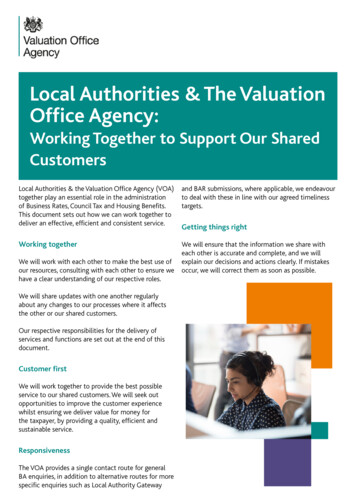
Transcription
Together forMental Health:A Strategy for Mental Healthand Wellbeing in WalesSummary Version
Ministerial ForewordsWhen I launched our Programme for Government in 2011I made a clear statement that creating the Wales of thefuture is something that involves all of us. What this meansis that no matter in which field or area we work, be it health,education, housing, the economy, or elsewhere, our actionsare all intertwined. The decisions we take in one area canhave a positive or negative effect in others, the impact ofwhich can far outlast the original decision. That is why thisWelsh Government has made sustainable developmentour central organising principle, a desire to improve social,economic and environmental wellbeing to the benefit of thepeople and communities of Wales.and culture, not just to our national identity but also to ourindividual and collective emotional wellbeing. Put simply, weall have a role and responsibility to deliver the objectives andoutcomes arising from this Strategy. Equally, we all stand tobenefit from its success, be that in a healthier population andworkforce, which will help drive the economic regenerationwe wish to see in our economy, or in stronger, more cohesivecommunities.Developing good mental health and resilience in individualsis about developing a more socially just Wales. WelshMinisters have committed to place this Strategy at the heartof policy development and we expect all of those who workwith us to do likewise.Together for Mental Health exemplifies this approach. Itsends a clear message that the delivery of the improvementsin mental health and wellbeing we want to see can only beachieved by concerted effort and commitment on behalf ofall Welsh Government departments and our partners. Thisis why, on behalf of my Cabinet colleagues, I am pleased tocommit the Welsh Government to delivering this Strategy.Welsh Ministers are embracing their responsibilities to deliverimprovements in mental health and wellbeing across theirRt. Hon. Carwyn Jones AMdepartments and portfolios. This may be by improving mental First Ministerhealth awareness in the workplace, recognising the impactOctober 2012of child poverty or acknowledging the importance of sports2
I am pleased to present Together for Mental Health, our new,age inclusive, cross-Government Strategy for mentalhealth and wellbeing. This Strategy elicited considerableinterest during its consultation, with over 250 writtenresponses helping to shape the final content.No single body or sector can transform mental health inWales. It is not the preserve of the NHS and Social Servicesalone. Only a partnership across the Public and Third Sectorscan deliver sustainable improvement. The Third Sector has asignificant role as service providers, advocates and in raisingawareness. The people of Wales are also key partners asWe all recognise the importance of a healthy lifestyle buteach citizen has a personal responsibility for their own healthfewer of us take time to consider our mental health. A quarter and wellbeing.of us will experience mental health problems or illness atsome point, having an enormous effect on those around us.Together for Mental Health is the approach we have takenWorse still, sufferers often face discrimination and stigma.in developing the Strategy. It will continue as we progressthis work together through our new National MentalTogether for Health, our 5 year vision for the NHS is clear that Health Partnership Board that will oversee delivery andgood health is vital to the creation of a prosperous, successful implementation.and sustainable Wales. Addressing the disadvantages facedby people with mental illness and ensuring equal access toI invite you to join with us to deliver this challenging butcare and treatment is essential to this. Together for Mentalachievable Strategy for mental health and wellbeing in Wales.Health builds on improvements in mental health servicesover the last 10 years, including the legal requirements ofThe Mental Health (Wales) Measure 2010. It takes this workforward, providing a long-term commitment to improve mentalhealth and wellbeing, backed by significant funding.The economic constraints we face mean services need to beredesigned to maintain standards and meet future demands.A key theme of this Strategy is the need to bring servicestogether to form a single, seamless, comprehensive systemfor addressing mental health needs across all ages.Lesley Griffiths AMMinister for Health and SocialServicesOctober 20123
IntroductionTogether for Mental Health is a cross-Government Strategy setting out our goals for improving mentalhealth and mental health services in Wales. It is our first Mental Health Strategy that covers all ages;children and young people, adults of working age and older people.It looks to promote the mental wellbeing of all people in Wales and to ensure that people with mentalhealth problems and mental illness get the support they need. This should be through an approach,which helps them to recover and looks at all the areas of a person’s life.This Strategy is based on a human rights approach and is an important step in supporting the rightsof children and young people under the United Nations Convention on the Rights of the Child.(UNCRC)The Strategy has been written through engagement and consultation with key partner agencies,service providers, service users and carers.Why do we need a Mental Health and Wellbeing Strategy?We want people in Wales to live healthy, productive lives, in safe communities that they can be a partof. We also want to support the development of a fairer society where everyone is able to make themost of themselves and be as independent as possible.Improving mental health and mental wellbeing is part of this because it should help for example: Address health and other inequalities Increase levels of education, gaining qualifications and employment opportunities Tackle poverty, drug and alcohol misuse, and homelessness Reduce the number of young people entering the youth justice system.4
What do we know about mental health and mental illness in Wales?Statistics around mental health and mental illness in Wales include: 1 in 4 adults experiences mental health problems or illness at some point during their lifetime. 1 in 6 of us will be experiencing symptoms at any one time. 2 in 100 people will have a severe mental illness such as schizophrenia or bipolar disorder. 1 in 10 children between the ages of 5 and 16 has a mental health problem and many morehave behavioural issues. Approximately 50% of people who go on to have serious mental health problems will havesymptoms by the time they are 14 and many at a much younger age. Between 1 in 10 and 1 in 15 new mothers experiences post-natal depression. 1 in 16 people over 65 and 1 in 6 over the age of 80 will be affected by dementia. 9 in 10 prisoners have a diagnosable mental health and/or substance misuse problem.What is the impact of poor mental health and mental illness?Poor mental health and mental illness can affect people of all ages, communities and the economy.On an individual: It can have an effect on all areas of life including life expectancy. In 2011 UKresearch found that people with severe or lasting mental illness died on average 10 years earlierthan the general population.Some mental health problems can be passed on through family generations. Poverty, loss, traumaand abuse can also cause mental health problems. These problems can make it harder to gainqualifications, get a job or stay in work, have an income or have good housing. This can lead tophysical health problems because of poor diet, lack of exercise, and drug or alcohol misuse.5
On the economy: The Friedli/Parsonage report estimated that the yearly cost of mental ill health inWales was 7.2 Billion in 2007-08.This includes costs like: Health and social care Output losses because people couldn’t work The impact on people’s lives.What progress have we made under previous mental health strategies?Our earlier strategies that have helped improve support for people of all ages.Some of the positive steps taken include: The Mental Health (Wales) Measure 2010 which is extending care in GP surgeries andensuring that Care and Treatment Plans look at every area of a persons life More people being cared for closer to home as community support services have beendeveloped for people of all ages Over 25% of people employed in Wales covered by the Healthy Working Wales Scheme Giving more opportunities for people of all ages to get involved in the decision making aboutthe planning of services, and how they are delivered and designed in local areas A range of initiatives providing support for children and their families, helping them cope andstepping in early when problems start Nearly 8,000 staff trained in Mental Health First Aid, over 1,200 in Youth Mental Health First Aidand over 3,000 in Applied Suicide Interventions Training Skills The development of Criminal Justice Liaison Services to spot and support mental healthproblems as soon as possible in people in the criminal justice pathway.126
How does this Strategy fit with the wider policy agenda of the WelshGovernment?Improving mental health and addressing mental illness help us to deliver other Welsh Governmentpriorities.What outcomes do we hope to achieve with this Strategy?The Strategy has 6 high level outcomes: The mental health and wellbeing of the whole population is improved. The impact of mental health problems and/or mental illness on individuals of all ages, theirfamilies and carers, communities and the economy more widely, is better recognised andreduced. Inequalities, stigma and discrimination suffered by people experiencing mental health problemsand mental illness are reduced. Individuals have a better experience of the support and treatment they receive and have anincreased feeling of input and control over related decisions. Access to, and the quality of preventative measures, early intervention and treatment servicesare improved and more people recover as a result. The values, attitudes and skills of those treating or supporting individuals of all ages with mentalhealth problems or mental illness are improved.More detailed outcomes to achieve these aims are set out at the beginning of each chapter.How will we deliver the Strategy and know it is making an impact?The Delivery Plan for this Strategy sets out the actions that Welsh Government and key partneragencies will take to make this happen. A new National Mental Health Partnership Board will be set up to oversee implementation andprogress towards our outcomes.127
Chapter 1Promoting Better Mental Wellbeing and PreventingMental Health ProblemsOutcomes Population wide physical and mental wellbeing is improved, people live longer, in better healthand as independently as possible for as long as possible. People and communities are more resilient and better able to deal with the stresses ineveryday life and at times of crisis. Child welfare and development, educational attainment and workplace productivity areimproved as we address poverty.SummaryMental wellbeing is when a person knows their own abilities, can cope with life’s stresses, workproductively and be an active part of their community. It’s about feeling good and functioning well.In the past mental health strategies in Wales have focused on treating and supporting people withmental illness. In this Strategy we also look at how we can help people have and keep good mentalhealth. Part of this will be by noticing when there is a risk of someone having a mental health issueand helping them to take action early.128
How will we deliver the outcomes? We will work with Health Boards, Local Authorities and other partners to make sure that peopleknow how to look after their own mental health and wellbeingWe will take steps to help break the cycle of inequality and poverty in Wales, with vulnerablepeople getting the help they needWe will support programmes and services that help people to have safer and enjoyable livesWe will work with schools and employers to make sure people have healthy and supportiveeducation and workplacesPublic service providers will promote mental wellbeing among those using their services, theirstaff, and where relevant, their studentsWe will support people to grow old well, keep their independence and to plan for their futuresWe will make sure that people with a mental illness, get the support they need and are informedabout how to have better mental wellbeing.At a population levelBuilding resilience, protecting and promoting mental health and wellbeing is at the heart of whatwe are doing to achieve a healthier and fairer society. Tackling problems like housing, poverty,unemployment and drug and alcohol misuse are really important. So is making sure people havelively bright communities, healthy schools, good work places and strong relationships.Within communitiesGood mental wellbeing is part of communities being healthy and lively with everyone workingand living positively together. In areas where there is the most poverty, there is also likely to bethe highest levels of poor mental health and mental health problems. We will continue to workthrough projects including the Communities First Programme to increase people’s life skills andunderstanding of good mental health.129
Planning and Environment: Having good housing and communities is an important part of mentalhealth and wellbeing. We have plans and policies in place to help develop new housing areas to givepeople a better quality of life.Sporting Activities: Exercise can have an important role in mental wellbeing. Getting children andyoung people into the habit of exercise will help them to be healthy. These will include play areas,cycle paths, places to go walking, safe streets and green open spaces.Arts and Culture: Taking part in arts and culture helps mental health because it helps people torelax, express who they are and improve confidence and self esteem through drama, literature, musicand art.In Schools: Schools play an important role in children and young people’s lives. We have manysuccessful projects and plans in place to support mental wellbeing in early years, learn life skills andhelp young people prepare for their adult lives. There are also school-based counsellors to help withissues like bullying.In the Workplace: Our Healthy Working Wales Scheme gives support to employers and employeesto improve health at work, prevent ill health and to support people returning to work.When anyone, including young people, faces unemployment, they are more at risk of becomingisolated, losing confidence or having low self-esteem. Over time this can damage their mental healthand wellbeing. We want to work closely with partners to help them by giving them the chance tovolunteer or get involved in other activities.Following the recent review of the Talk to Me Action Plan, we will continue to progress action toreduce suicide and self harm.1210
For individualsFor all ages: Everyone needs good information about the ways that they can have better health andwellbeing. This is particularly important for people with mental illness who have higher risks of poorgeneral health. We are supporting programmes like Stop Smoking Wales, National Exercise ReferralScheme and Change4life that help to tackle problems like lack of exercise, poor diet and drug andalcohol misuse.We will also focus on helping people at risk of mental health problems including those whom: Are vulnerable groups and with protected characteristics under the Equality Act Are asylum seekers Refugees Have left the armed services Women subject to violence and children experiencing domestic abuse Are homeless Have experienced domestic violence Are in the youth justice system or custody.Local Authorities and partners will therefore have a new duty for the wellbeing of people in need.For children and young people: Our approach has the rights of the child and UNCRC at its heart.We are committed to its ‘7 Core Aims’ and we want all children and young people to: Have a flying start in life Be well educated Enjoy the best possible health Have access to an enriched environment Be listened to and treated with respect Feel safe Not be disadvantaged by poverty.1211
Improving the health of children is a priority. We will continue to support a range of programmessuch as Flying Start, Families First and Teams Around the Family. We want to help children, youngpeople and their families by showing them how to have life coping skills and how to notice the firstsigns of a mental health problem so they can get the help they need as soon as possible. Collegesand university staff should also need to understand the role they play in helping students when theygo through transitions.For adults and older people: Promoting mental health and wellbeing with people who are olderhelps everyone in society. Their independence and the ability to stay in their own home is importantto good mental health, and feeling lonely or isolated can lead to mental health problems. Supportand counseling at key times like retiring, loss of a partner or moving home is a priority.There are projects that help older people to volunteer, do courses and other activities that helpmental and emotional wellbeing.There are also other activities that older people can do to help lower the risk of dementia like: Exercising both mind and body Not smoking Achieving and maintaining a healthy weight and eating a healthy diet Controlling high blood pressure, blood sugars and reducing cholesterol.1212
Chapter 2A New Partnership with the PublicOutcomes People with protected characteristics and vulnerable groups, experience equitable access andservices are more responsive to the needs of a diverse Welsh population. Welsh speakers in Wales are able to access linguistically appropriate mental health treatmentand care where they need to do so. People in Wales have the information and support they need to sustain and improve theirmental health and self manage mental health problems. People with mental ill health experience less stigma and discrimination and feel that theseproblems are being tackled. People feel in more control as partners in decision making about their treatment and how it isdelivered. Families and carers of all ages are involved in assessments for support in their caring roles. People of all ages and communities in Wales are effectively engaged in the planning, deliveryand evaluation of their local mental health services.SummaryFor this Strategy to work we need the public and public services to have good information aboutmental health issues and mental wellbeing.We want people to get the support and help they need as soon as they spot there is a problem.Tackling the stigma that is attached to mental health and dementia is a key aim and will encouragepeople to get advice from family, friends and services.1213
How will we deliver the outcomes?We will: Do more to help people understand mental health issues and to seek help early to manage theirown care. Work with Time to Change Wales (TTCW) to make sure that we tackle stigma anddiscrimination. Expand primary care mental health services in places like General Practitioner (GP) surgeriesby meeting the requirements of The Mental Health (Wales) Measure 2010. Make sure Statutory Care and Treatment Plans are developed with service users of all agestaking part in the decisions that affect their lives co-produced and, where ever possible involvingfamilies and carers where appropriate. Make sure that health and other public services engage with service users and carers of all agesto plan, design, deliver and evaluate services.Ensuring equalityLots of different people, from a mix of different cultures and traditions, live in Wales.Service providers must meet their legal duties to ensure that people’s human rights are protected.Services must be based on individual need so that no-one is disadvantaged. Strong leadership andgood staff training will help us to achieve this.Meeting the needs of Welsh speakersHaving services available in Welsh is a need for many Welsh speakers. People with mental healthproblems can be more vulnerable if the help and support they need is not available in the languagethey speak. The ‘active offer’ principle means that services must offer Welsh language rather thansomeone having to ask.1214
Promoting mental health awarenessFor the whole population: We will make sure that the public have up-to-date, good qualityinformation about how to look after their mental health and how to spot when they, or someone intheir family, have the beginnings of a mental health problem.We will promote the help lines that we fund for all ages, so that people can get help and adviceat any time. Staff working in mental health services must have information about what help and isavailable so they can help people get the support they need.For children and young people: We will be working with schools via the Healthy Schools network,youth clubs, colleges, Youth Offending Teams, and other groups to raise awareness about mentalhealth issues and wellbeing.We will work with children and young people to make sure that services meet their needs, that theyare involved in decisions that affect their lives when possible, and that they get the information in theright format in the places that they go.For adults and older people: For people of working age, negative attitudes towards mental illnessin the workplace can lead to people fearing they’ll lose their job or be treated unfairly. This can meanthat people try and cover up problems. We will promote the Healthy Working Wales Scheme thathelps employers and employees to get support and advice around mental health issues throughwebsites and advice lines.Older people and their families need help to know how to plan for their future. Information packs,websites and help lines will be increasingly available to help families who need advice about issueslike Dementia.1215
Reducing stigma and discriminationPeople with mental health illness can face stigma and discrimination. In children and young peoplethis can lead to bullying and in adults it can damage opportunities and reduce people’s hope. Weare working to tackle this.Some of the negative attitudes towards mental health problems and dementia come from themedia like TV, newspapers and other printed materials. Even inside our services some staffmisunderstand and fear people with mental health problems and mental health illness. Our workwith TTCW aims to change public attitudes and behaviour towards mental illness and reduce thestigma and discrimination experienced by people with mental health problems.Engaging people in their own careWe want service users, their carers, and families to be able to take an active part in planning andmanaging their own care. Service providers need to make sure that there is good information, helpand support so that people have real choices. Under The Mental Health (Wales) Measure 2010people receiving secondary care (specialist mental health services) have a care co-ordinator whowill make sure that their Care and Treatment Plans are developed with them whenever possible.An advocate can also help their views get heard.1216
Support for families and carersFamilies and carers of all ages, especially young carers, have an important role in the care andtreatment of people with mental health problems. They need support to carry out this role includinginformation, training, financial and emotional support.Carers of all ages have a legal right to ask for an assessment of their own needs.We are currently updating the Carer’s Strategy for Wales to make sure that carers are aware of theirrights.Active involvement of service users in service design, delivery andmonitoringPeople of all ages who use mental health services must be involved in service design and howit is provided. Their views and voice can make services better. This includes being involved onprofessional appointment panels for staff and mental health planning groups. They may need trainingand support to do this.1217
Chapter 3A Well Designed, Fully Integrated Network of CareOutcomes Service users experience a more integrated approach from those delivering services. People of all ages benefit from evidence-based interventions delivered as early as possibleand from improved access to psychological therapies. Service user experience is improved with safety, protection and dignity ensured andembedded in sustainable services. Providers are positively managing risk, supporting people to increase their levels of hope andaspiration and enabling them to realise their full potential through recovery and enablementapproaches.SummaryWe want to make sure that less people in Wales develop mental health problems.For people who do need services at any time of their lives, we want the problems to be spottedearly so they can get the help and support that they need quickly and stop these problems fromgetting worse. As mental health problems often happen alongside other health and social issues,we want services to work together to give support.1218
How will we deliver outcomes? Partner agencies will be expected to jointly plan and provide integrated services andenvironments to meet the needs of those with mental health problems in a person centredapproach.Health Boards, Local Authorities and other service providers will be expected to show that thesupport and treatment offered are based on evidence, are safe and therapeutic, keep people’sdignity and independence promoting recovery or enablement.Agencies will make sure that their services offer good early intervention, using a “psychologicallyminded” approach to improve outcomes and to help reduce unnecessary hospital admissions.Service providers will review their approach to risk management and safeguarding issues.Primary Care Mental Health Services will be developed in line with the requirements of TheMental Health (Wales) Measure 2010.Service planners will be asked to review care pathways with service users to make sure theyare seamless, meet the specific needs of all age groups and work together to meet the complexneeds of people with co-occurring problems like learning disabilities or substance misuseproblems.19
Service providers working togetherImproving mental health needs all sectors to work together with people being treated equally, withdignity, respect and compassion so they can trust and have confidence in the services they receive.Mental health services and physical health services must work together to make sure that thephysical health needs of people with mental illnesses are met. Staff working in primary and secondaryservices such as GP surgeries, community health services, physical health teams and psychiatricunits must work together and be trained in how best to support people with mental health problemsand illness.Joining Health and Social Care: The Mental Health (Wales) Measure 2010 places statutory dutieson the NHS and Local Government to provide joint solutions between health and social care forpeople of all ages. This will be strengthened in the Social Services Bill.Direct Payments: For some people direct payments mean they can make a choice and manage thecare and support services they use. This gives them more control.The Third Sector: Voluntary organisations, companies and charities, known as the Third Sector, playan important part in supporting people with mental health issues. Statutory services need to work inpartnership with them.1220
Holistic care throughout the care pathwayWe want to look at all aspects of a person’s needs and treat the whole person.Primary CareOur aim is for mental health problems to be identified as early as possible and for people to get thehelp they need when they need it. The care and support given through GP surgeries is a key part ofthis. They are often the first people to identify the signs of mental health problems and can link peopleto other services when they need them. More services are being developed in primary care settingsthrough The Mental Health (Wales) Measure 2010. Community pharmacies, dentist, and healthvisitors also play a part in this.For children and young people: Spotting the signs of a mental health problem and providing helpas soon as possible is important. Tier 1 Children and Adult Mental Health Services (CAMHS) workwith others such as School Nursing services and School-based Counselling and Youth OffenderTeams to meet these needs and improve appropriate access to CAMHS.Youth justice services and CAMHS need to develop links with police and other appropriate criminaljustice agencies to make sure those who have become disengaged from mainstream services can beidentified and given the relevant care and support to enable them to lead crime free lives.For people with a learning disability and mental health problems: Primary mental health serviceswill need to make sure that they are skilled and supported by Learning Disability Specialist Teams.1221
For older people: GP surgeries, community nurses and other care services are key in spottingmental health problems like depression and anxiety, and in identifying early signs of dementia in olderpeople. Appropriate referrals to memory clinics, psychosocial or psychological interventions, enablepeople to make timely, financial and future decisions.Community ServicesSome people with mental health problems will need specialist services. CAMHS teams andCommunity Mental Health Teams (CMHTs) for adults and older people must make sure all peopleneeding specialist services can access them quickly and easily including evenings and on weekends.Specialist services such as Community Intensive Intervention Teams (CIITs) for childr
What do we know about mental health and mental illness in Wales? Statistics around mental health and mental illness in Wales include: 1 in 4 adults experiences mental health problems or illness at some point during their lifetime. 1 in 6 of us will be experiencing symptoms at any one time. 2 in 100 people will have a severe mental illness such as schizophrenia or bipolar disorder.










